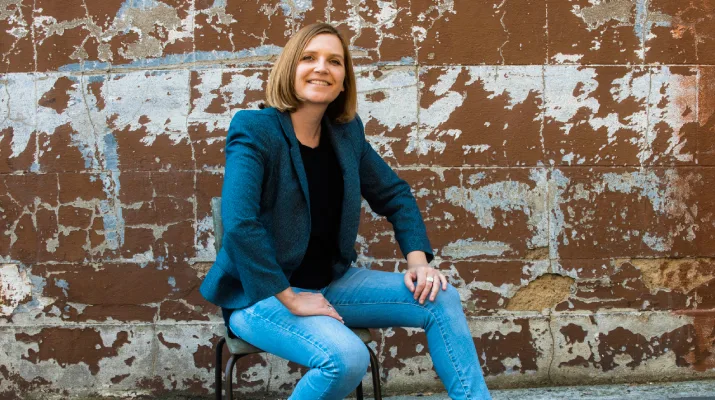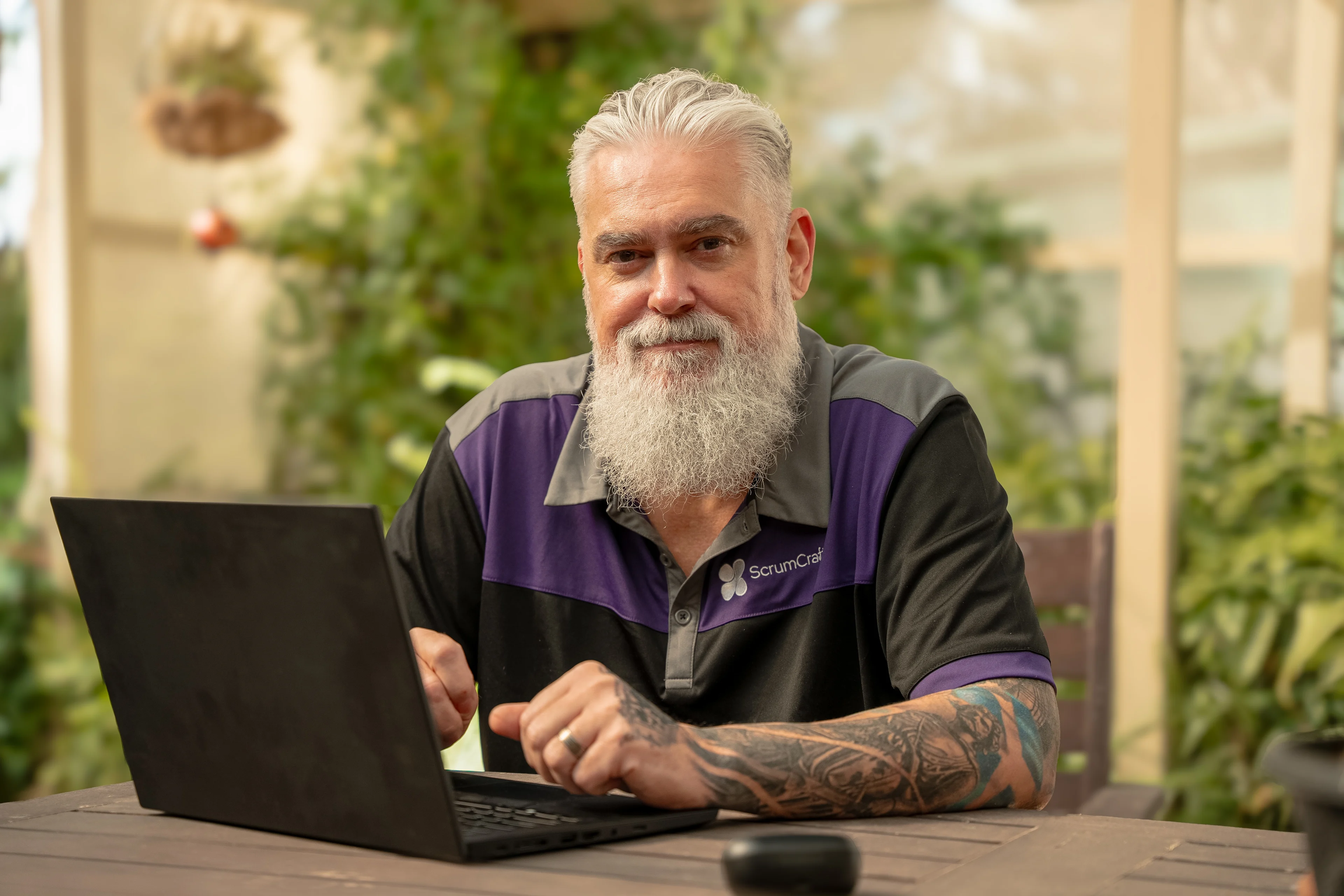How to nail your personal and professional development goals
By Open Universities Australia
Ready to live a life you’re excited about? Career coach Kate Richardson has the lowdown on how to define your personal and professional development goals.
Kate Richardson knows a thing or two about how to make life changes.
In 2019, the self-described “corporate runaway” left the media and marketing world to start her own career coaching venture.
These days, Kate helps all kinds of people make the changes they need to live more satisfying professional lives.
“I knew it was time to get off the treadmill and do something different,” she says of her own career change.
“I'd always had a passion for supporting people and enabling people in their careers—so this seemed like a great next step for me.”
Kate says working out your next move doesn’t have to mean quitting your job and taking to the open highway—it can start with smaller changes.
People often think about making a career change—or figuring out the next step—as a big leap. In reality, it's often a series of smaller steps. It's really about exploring and experimentation and testing and trying things out.
One of Kate’s clients made the move from working in university communications to learning design, and another started a knitting pattern side hustle during the pandemic that has become her full-time gig. Both started by trying new approaches.
If you’re feeling a little stuck where you are, there are certain questions you can ask yourself to develop both personally and professionally and craft a life that you’re excited to live.
What is personal development?
“Personal development is about working on yourself and developing the skills and awareness that will help you be the person that you want to be in your life,” says Kate.
She says developing stronger self-awareness will help you in all parts of your life.
“If you're working on developing a skill or strength in one domain of your life, for example, in your relationship at home, then that's going to have positive influence in how you show up at work, how you collaborate with colleagues [or] the kind of manager you are.”
What is professional development?
Professional development, of course, refers to the career-specific aspects of your life you want to improve.
“People can sometimes overcomplicate the career development process,” says Kate.
“In organisations, people are often charged with completing five- or six- or 10-page forms around how they want to develop their career and that’s considered a primary tool.”
While that can be useful, she suggests getting back to basics and asking some more simple questions.
Ask yourself: What do I want to get better at? What do I want to do more of and what do I want to do less of? Questions like that can be really helpful.
Kate says there are many professional development opportunities out there. For you, it might mean getting exposure on a new kind of project, shadowing someone, or working with a mentor. Or it could look like enrolling in an educational course or finding a volunteering opportunity that will give you new skills.
She adds that challenging yourself in new ways is incredibly beneficial.
“You're not just building your capabilities—but also your confidence. That comes if you stretch yourself and learn that you're actually more capable than you might have realised.”

Kate's development advice
To work out where you want to go, in both a professional and personal sense, you’re going to have to do a bit of self-reflection.
Here are Kate’s top tips for working out what you want to work on and how you can start moving towards your development goals.
Consider values, strengths and skills (yes, there’s a difference)
Stronger self-awareness can come when you think deeply about what you really value— trying to minimise the influence of family and friends (who might hold quite different values to you).
“For example, if one of your values is independence, then you might be drawn to starting a side project where you can [practise] that or finding yourself in a role where you've got plenty of autonomy to make decisions or work to your own style,” suggests Kate.
Next, you can examine your skills and strengths—being mindful of the difference between the two.
Related reading: How to negotiate a higher salary
“A skill is something that you perform well—but it doesn't necessarily have to be something that you really enjoy—whereas a strength is something that you find energising and really enjoyable,” Kate explains.
“A lot of work goes on in organisations around strength. That’s because we know that when your work lines up with your strengths, it gives you an opportunity to be at your most engaged, at your best, and motivated to learn.
“So, if you get clear on what your strengths are, you can think about opportunities to develop and learn that really give you the chance to keep growing in that area.”
Work backwards from where you want to be
“If you’re aspiring to a particular role or promotion, then it makes sense to work backwards,” says Kate.
For example, if you want to start managing people but have never done it before, you can start working out what capabilities you need to make the transition.
“You can do that by talking to someone who's made a similar move or talking to someone who's an experienced people manager who might be able to [tell you] what you need to be doing differently or what skill gaps you have,” says Kate.
“You can look for opportunities to start to develop those skills by proactively mentoring a junior member of your team or getting involved in a project where you have the opportunity to supervise people.”
Optimise for interesting
“If you're not sure where you want to go—and that happens—I would simply say in the words of [Columbia Business School professor] Dorie Clark, optimise for interesting,” suggests Kate.
“Follow your curiosity and think: What are you excited to learn about? What are you interested in? What are you curious about?”
Kate emphasises that our careers rarely go in a straight line, and it pays to stay open-minded.
Being open to where your interests take you, where your curiosity might steer you, and what you might discover along the way could light your fire around something that you weren't necessarily expecting to enjoy.
Talk to other people
Kate says it’s worth having a chat with people who are in a role or area of work that you are interested in moving into—especially if you are considering something like a professional development course.
“Make sure you talk to the people who are doing the kind of role or are on the sort of path that you are looking at, because they're always the best placed people to advise you on what course to do, or what to consider,” she says.
“They're in the role, they know what's going to be valuable in terms of the day-to-day nature of the work that they're doing.”
Personal development courses
After you’ve spent a bit of time thinking about where you’re at and where you want to go, you can start looking at specific development opportunities.
You may decide you want to work on personal skills—such as Japanese or financial management or living more creatively—which will likely help you out at home and at work.
There are lots of short online courses available through Open Universities Australia that can help you fine tune these skills and build your confidence.
Professional development courses
There are also plenty of opportunities to upskill in particular professional areas.
You can focus on an industry-specific area and gain accreditation that you need before taking on a new role, or you can focus on an area that’s more general in nature, such as critical thinking, writing or people managing.
Through us, you can access short courses and single subjects offered by leading Australian universities, that cover everything from data and analysis to the psychology of leadership to nutrition and health. These courses run flexibly online to suit working professionals.
Have a browse of our short course marketplace and see what takes your fancy.
If you’re not sure where to start, you can even study personal and professional development as a topic on its own. These short courses are designed to help you identify your goals and how you learn, and they’re recommended for people who haven’t chosen a career yet or those just starting out in their field.
For career coaching, get in touch with Kate via her website.
Not sure what to study?
Take our 2-minute quiz to find the right course for you.



